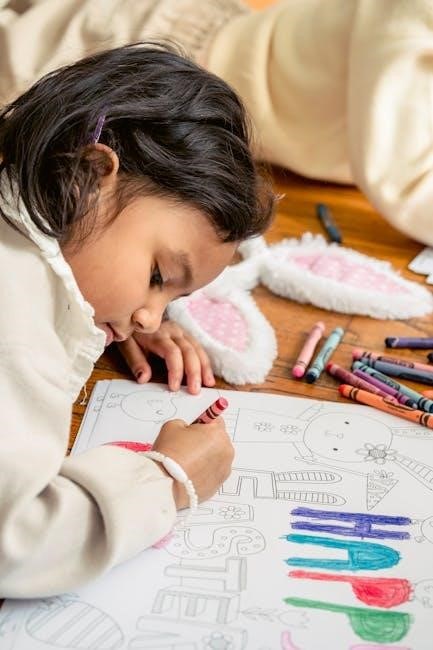happiness: a guide to developing life’s most important skill
Happiness is a profound state of well-being and contentment, rooted in cultivating inner peace and fulfillment. As Matthieu Ricard emphasizes, it is a skill that can be nurtured through mindful practices, self-awareness, and compassion, transforming life’s challenges into opportunities for growth and joy.
1.1 What is Happiness?
Happiness is a profound state of well-being and contentment, characterized by joy, fulfillment, and inner peace. It is not merely a fleeting emotion but a skill that can be cultivated through mindful practices, self-awareness, and compassion, as emphasized by Matthieu Ricard.
1.2 Why is Happiness Important?
Happiness is essential for overall well-being, fostering resilience, positive relationships, and life satisfaction. It enhances mental and physical health, while also inspiring personal growth and fulfillment. As a skill, happiness empowers individuals to navigate life’s challenges with joy and purpose, making it a cornerstone of a meaningful and thriving life.

The Science Behind Happiness
Happiness is rooted in brain function and neurotransmitter activity, particularly dopamine and serotonin, which regulate pleasure and mood. Understanding this science helps cultivate intentional practices for well-being.
2.1 Understanding the Brain’s Role in Happiness
The brain plays a crucial role in happiness through neurotransmitters like dopamine and serotonin, which regulate mood and pleasure. Understanding this neural mechanism empowers us to cultivate happiness by fostering positive emotions, mindfulness, and gratitude, ultimately enhancing our ability to develop this essential life skill.
2.2 The Role of Neurotransmitters
Neurotransmitters like dopamine and serotonin play a vital role in happiness by regulating mood, pleasure, and emotional balance. These chemicals, often termed “feel-good” hormones, are influenced by practices such as mindfulness, gratitude, and positive thinking, which can naturally boost their levels, fostering a deeper sense of well-being and life satisfaction.
2.3 How Emotions Influence Happiness
Emotions significantly impact happiness. Positive emotions such as joy and gratitude enhance well-being, while negative emotions can detract from it. Recognizing and managing emotional responses helps maintain balance, fostering a more consistent state of happiness.

Developing Happiness as a Skill
Happiness is a skill that can be cultivated through consistent effort and training the mind. It involves developing qualities like mindfulness, gratitude, and compassion to enhance well-being.
3.1 Daily Practices for Cultivating Happiness
Daily practices such as mindfulness meditation, gratitude journaling, and positive reflections can foster happiness. Incorporating acts of kindness, physical activity, and meaningful social interactions also contribute to well-being. Consistent efforts to reframe negative thoughts and embrace joy in small moments help build a resilient and cheerful mindset over time.
3.2 The Power of Gratitude
Gratitude is a powerful tool for cultivating happiness by shifting focus from what’s lacking to what’s abundant. Practicing gratitude through journaling, reflection, or expressing thanks enhances well-being and life satisfaction. Scientific studies show it fosters resilience, strengthens relationships, and promotes a positive mindset, making it a simple yet transformative daily practice for lasting joy.
3;3 Retraining Your Thought Patterns
Retraining thought patterns involves recognizing and replacing negative, limiting beliefs with positive, constructive ones. By cultivating mindfulness and reflection, individuals can shift their mental habits, fostering a more optimistic outlook. This practice, inspired by Buddhist teachings, helps develop emotional resilience and increases overall joy, aligning with Matthieu Ricard’s approach to happiness as a skill.
Factors Influencing Happiness
Happiness is shaped by external circumstances, internal mindset, and life choices. Cultivating resilience and positive thinking enhances emotional well-being, as Matthieu Ricard’s teachings emphasize.
4.1 External vs. Internal Factors
External factors like life circumstances and environment influence happiness, but internal elements such as mindset, gratitude, and self-awareness play a more significant role. Matthieu Ricard highlights that true happiness stems from cultivating inner peace and resilience, rather than relying solely on external conditions;
4.2 The Role of Life Circumstances
Life circumstances, such as financial stability, health, and relationships, significantly shape our experiences of happiness. While these external factors can influence well-being, they are often temporary and beyond our control. Matthieu Ricard suggests that true happiness lies in how we perceive and respond to these circumstances, emphasizing the importance of internal resilience and mindset.
4.3 The Impact of Mindset
Mindset plays a crucial role in determining happiness, as it shapes how we perceive and respond to life’s challenges. A positive, resilient mindset fosters well-being by helping us focus on solutions rather than problems. Matthieu Ricard highlights that mindset is within our control, making it a powerful tool for cultivating lasting happiness and life satisfaction through intentional thoughts and practices.

Practical Strategies for Achieving Happiness
Practical strategies for happiness include mindfulness, gratitude, and fostering positive habits. Matthieu Ricard emphasizes that cultivating these practices daily can lead to lasting well-being and fulfillment in life.
5.1 Setting Goals and Aspirations
Setting meaningful goals aligns with personal values, fostering purpose and direction. Matthieu Ricard suggests that goals should promote growth and well-being. Break aspirations into manageable steps, practice positive visualization, and celebrate progress to cultivate a sense of achievement and lasting happiness through consistent effort and self-awareness.
5.2 The Power of Small, Everyday Joys
Small, everyday joys, like a beautiful sunset or a kind word, boost happiness. Mindfulness and gratitude help appreciate these moments, fostering optimism and well-being. Incorporating such joys into daily life creates a foundation for lasting happiness and fulfillment, reminding us that true joy often lies in life’s simple pleasures and meaningful connections.
5.3 Building Strong Social Connections
Strong social connections are vital for happiness, providing emotional support and shared joy. Nurturing relationships through quality time, active listening, and empathy fosters trust and belonging. Prioritizing meaningful interactions and cultivating a supportive network enhances well-being, as social bonds are among life’s greatest sources of fulfillment and long-term satisfaction.
Overcoming Obstacles to Happiness
Overcoming obstacles to happiness involves cultivating resilience, mindfulness, and gratitude to navigate life’s challenges effectively and maintain a positive outlook.
6.1 Addressing Common Challenges
Common challenges to happiness include stress, anxiety, and unrealistic expectations. Mindfulness and gratitude practices help alleviate these issues by fostering mental clarity and positivity. Recognizing negative thought patterns and reframing them is essential for maintaining emotional balance and resilience in the face of adversity.
Additionally, addressing obstacles often requires self-awareness and proactive strategies, such as setting realistic goals and nurturing supportive relationships, to create a foundation for lasting well-being and joy.
6.2 Managing Stress and Anxiety
Effective stress and anxiety management is crucial for cultivating happiness. Techniques like meditation, deep breathing, and mindfulness can significantly reduce stress levels. Practicing gratitude and reframing negative thoughts also helps maintain emotional balance. Regular physical activity and adequate sleep further support mental well-being, creating a foundation for resilience and joy.
By incorporating these practices, individuals can better navigate life’s challenges with positivity and clarity, fostering lasting happiness and peace of mind.
6.3 Building Resilience
Building resilience is essential for navigating life’s challenges with emotional strength and adaptability.
It enables individuals to bounce back from setbacks, fostering a sense of control and optimism.
Practices like mindfulness and reframing challenges as opportunities for growth can enhance resilience.
Cultivating resilience strengthens mental well-being and paves the way for lasting happiness.

The Role of Mindfulness in Happiness
Mindfulness cultivates present-moment awareness, allowing individuals to embrace life’s experiences without judgment. Rooted in practices like meditation, it fosters emotional balance and clarity, essential for lasting well-being and happiness.
7.1 Understanding Mindfulness
Mindfulness is the practice of being fully present and engaged in the current moment, while cultivating a non-judgmental awareness of one’s thoughts, feelings, and bodily sensations. Rooted in Buddhist traditions, it involves observing experiences without attachment, fostering emotional balance and resilience. By focusing on the present, mindfulness helps individuals develop clarity and peace, essential for nurturing happiness and well-being in daily life.
7.2 Mindfulness Practices for Daily Life
Mindfulness practices such as meditation, deep breathing, and mindful eating can be seamlessly integrated into daily routines. These techniques encourage present-moment awareness, reducing stress and enhancing emotional well-being. Regular practice fosters calm, clarity, and a positive outlook, helping individuals navigate life’s challenges with greater ease and resilience, ultimately contributing to lasting happiness and life satisfaction.
7.3 The Connection Between Mindfulness and Well-being
Mindfulness deeply enhances well-being by fostering present-moment awareness, reducing stress, and cultivating emotional balance. Regular practice improves mental clarity, resilience, and overall life satisfaction, creating a foundation for lasting happiness. By nurturing calm and self-awareness, mindfulness directly contributes to a fulfilling and joyful life, aligning with the principles of happiness as a skill.

Happiness and Its Relation to Success
Happiness, as a cultivated skill, directly influences success by fostering well-being, resilience, and life satisfaction. It creates a foundation for achieving fulfillment and effectiveness in personal and professional realms.
8.1 Redefining Success
Success is often redefined through the lens of happiness, emphasizing well-being over mere achievements. True success encompasses positive emotions, life satisfaction, and resilience. By prioritizing these elements, individuals align their pursuits with fulfillment, as taught by Dr. Laurie Santos. Matthieu Ricard further emphasizes that cultivating happiness as a skill leads to lasting success and life fulfillment.
8.2 The Interplay Between Happiness and Achievement
Happiness and achievement are deeply intertwined, with happiness often fueling success. Matthieu Ricard suggests that cultivating inner fulfillment enhances resilience and motivation, leading to more meaningful accomplishments. Dr. Laurie Santos adds that prioritizing well-being fosters a mindset where achievements align with personal values, creating a sustainable path to both happiness and life fulfillment.
8.3 Finding Fulfillment in Life
Fulfillment arises from aligning actions with personal values and passions, fostering a sense of purpose. Matthieu Ricard highlights that true fulfillment comes from cultivating compassion and contributing to others’ well-being. Dr. Laurie Santos adds that prioritizing meaningful goals and nurturing relationships leads to lasting satisfaction, emphasizing that happiness is a skill that enhances life’s purpose and joy.
Inspirational Stories of Achieving Happiness
Matthieu Ricard, a scientist turned Buddhist monk, exemplifies happiness cultivated through mindfulness and compassion. His journey inspires others to seek fulfillment by embracing inner peace and purposeful living.
9.1 Real-Life Examples of Happiness
Matthieu Ricard, a molecular biologist turned Buddhist monk, embodies happiness through mindfulness and compassion. His journey from science to spirituality highlights the transformative power of inner peace and purposeful living, inspiring countless individuals to pursue fulfillment through meaningful practices and heartfelt connections.
9.2 Lessons Learned from Happy Individuals
Matthieu Ricard’s journey from scientist to monk reveals that happiness stems from cultivating inner peace and compassion. Happy individuals often prioritize gratitude, mindfulness, and meaningful connections. Dr. Laurie Santos’s research also highlights that happiness is a skill developed through intentional practices, emphasizing the importance of aligning actions with personal values and fostering resilience.
9.3 Applying These Lessons to Your Life
Start by incorporating gratitude practices, such as journaling, and mindful breathing exercises into your daily routine. Prioritize meaningful connections and align your actions with personal values. Cultivate kindness and compassion, as Matthieu Ricard suggests, and embrace challenges as growth opportunities. Small, consistent efforts can lead to lasting positive change and fulfillment in your life.
Maintaining Long-Term Happiness
Maintaining long-term happiness requires continuous growth, nurturing positive emotions, and embracing life’s journey with gratitude. These practices help anchor a deep sense of contentment and fulfillment.
10.1 Building Sustainable Habits
Building sustainable habits is crucial for long-term happiness. Consistent practices like gratitude, mindfulness, and self-care create a resilient foundation. These habits, rooted in Matthieu Ricard’s teachings, foster emotional balance and adaptability, ensuring happiness endures through life’s challenges and changes, while promoting a stable, fulfilling existence over time.
10.2 The Role of Mindfulness and Presence
Mindfulness and presence are essential for lasting happiness. By focusing on the present moment, individuals reduce mental noise and enhance emotional resilience. Matthieu Ricard highlights that mindfulness fosters a deep connection to life, allowing one to fully engage with experiences and cultivate joy without being distracted by the past or anxious about the future.
10.3 Continuous Growth and Development
Continuous growth and development are vital for sustaining happiness. Matthieu Ricard emphasizes that cultivating new skills, embracing lifelong learning, and fostering self-improvement enrich life’s purpose. By adapting to change and pursuing personal evolution, individuals build resilience and maintain a dynamic, fulfilling existence that aligns with their values and aspirations.
This guide demonstrates that happiness is a skill cultivated through practice, mindfulness, and compassion. Embrace life’s journey with purpose, fostering joy and fulfillment at every step.
11.1 Recap of Key Points
Happiness, as explored, is a skill cultivated through mindfulness, compassion, and self-awareness. Matthieu Ricard highlights its development as a transformative journey, emphasizing inner peace and fulfillment. By embracing practices like gratitude and retraining thought patterns, individuals can navigate life’s challenges with resilience, fostering enduring joy and purpose in their lives.
11.2 Final Thoughts on Pursuing Happiness
Happiness is a journey of self-discovery and growth. Cultivating mindfulness and compassion transforms life’s challenges into opportunities for joy and resilience. Matthieu Ricard teaches that true fulfillment arises from within, guiding us to embrace life with purpose and lasting contentment, leading to enduring happiness.

Additional Resources for Further Exploration
Explore books like Matthieu Ricard’s works and Yale’s Happiness Lab. Discover online courses and join communities for deeper insights and practical tools to cultivate happiness effectively.
12.1 Recommended Reading on Happiness
Explore Matthieu Ricard’s Happiness: A Guide to Developing Life’s Most Important Skill and Shawn Achor’s The Happiness Advantage. These books offer practical insights and scientific approaches to cultivating happiness. Additional recommendations include The How of Happiness by Sonja Lyubomirsky, providing evidence-based strategies for enhancing well-being and life satisfaction through intentional practices and mindset shifts.
12.2 Online Courses and Workshops
Explore online courses like The Science of Well-Being from Yale University, based on Dr. Laurie Santos’ renowned class. Platforms like Coursera and Mindvalley offer workshops on cultivating happiness, mindfulness, and emotional intelligence. These resources provide practical exercises and scientific insights to help develop life’s most important skill, aligning with Matthieu Ricard’s principles of mindful living.
12.3 Communities and Forums
Join online communities like Facebook groups focused on happiness or Reddit forums such as r/happiness. These spaces offer support, shared experiences, and resources for cultivating well-being. Engage with others who prioritize mindful living, fostering connections and motivation. Such forums provide a platform to exchange ideas and learn from individuals on similar journeys toward developing life’s most important skill.
Final Thoughts and Encouragement
Happiness, as a skill, requires consistent effort and mindfulness. Embrace the journey of cultivating joy, gratitude, and resilience. Remember, true fulfillment comes from within. Draw inspiration from resources like Matthieu Ricard’s wisdom and Yale’s Happiness Lab. Stay committed to your growth, and celebrate small victories along the way. Happiness is a lifelong journey worth pursuing with passion and dedication.

